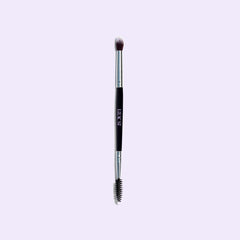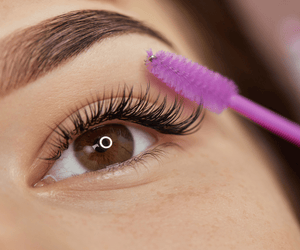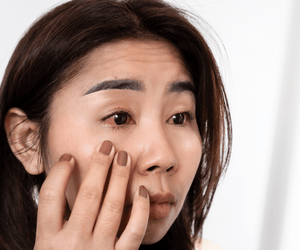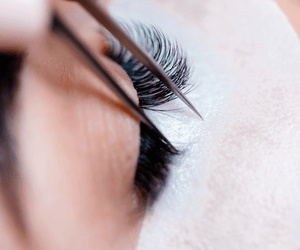
To no one’s surprise, mascara is the most popular type of makeup in the world. It’s quick and easy to apply and looks good even on its own. So far, so good… But does mascara make your eyelashes fall out?
Considering it’s designed to enhance the lashes, using a mascara that wrecks them would be self-defeating. In this post, we explore this question in depth. We’ll explain why mascara can lead to lash loss in some cases and what you can do about it.
Table of Contents
Can mascara make lashes fall off?
Yes, mascara can make your lashes fall off, but that doesn’t mean it will. In a study on 128 mascara-lovers, 19% of participants experienced lash loss. The researchers found a few exciting correlations between mascara and eyelash loss that suggest that there is a connection.
They found that the participants who experienced eyelash loss had used mascara consistently for years. They also found that those users were likely to experience itching in the eye area, which may or may not have been related to the mascara.
Other factors had more to do with the product and mascara removal method, which we will discuss in more detail below.
Why do my eyelashes fall out after using mascara?
If you find that a lot of your lashes fall out after you’ve used mascara, here are a few potential causes:
You’re removing it incorrectly
Mascara creates a coat intentionally meant to stay put around the lashes, so taking it off can be challenging. Unfortunately, any pressure on the lash line, including rubbing with a cotton pad or fingers, can lead to eyelash shedding. That’s why removing your mascara correctly is important, with methods that minimize friction, allowing it to break down on its own.
The study we mentioned earlier found a strong correlation between eyelash loss and using water for mascara removal, as well as eyelash loss and waterproof mascara. It’s not surprising - most mascaras are designed to withstand water, so water is a terrible solvent.
Wearing it for too long
Wearing mascara for prolonged periods can also cause lashes to fall out. Leaving it on too long can be highly irritating and clog lash follicles or glands. The inflammation from irritation and the obstruction to the lash line often results in lash loss and may also impact your lash line’s overall growth cycle.
Rubbing your eyes
If your mascara feels uncomfortable, it can prompt you to rub your eyes and inadvertently pull out some lashes. Rubbing when you have mascara on can be especially damaging since the brittleness of the formula could also lead to breakage.
Drying formula
While it's probably not a significant factor in lash loss, dry mascara formulas can be stiff. This may increase the risk of lash breakage since a stiff coating can also be brittle. If you think this might be an issue, look for mascara formulas advertised as “flexible.”
Curler after mascara
We don’t think using a lash curler after mascara is a sin, but it’s still a habit that could lead to lash loss. Using a lash curler after you've applied mascara can put undue stress on the lashes, especially if the mascara has already dried down.
If you ensure your mascara is still damp, gently curling the lashes after mascara can still be a safe method to achieve a dramatic curve and lift. But if you’re already experiencing lash shedding, you might want to avoid lash curlers altogether. Another option is to use a heated lash curler that won’t pressure the line.
Allergies or infections
Another way that mascara might lead to lash loss is by causing an allergy or infection. Allergic reactions can occur if your immune system decides an ingredient in your mascara is harmful. Infections may happen if your mascara tube is contaminated or expired.
Either one can lead to inflammation in the lid or eyes, which can impact the healthy functions of your lash follicles. That said, there will be other symptoms beyond just lash shedding, such as redness, swelling, pain, or itching, that you find more pressing.
What is mascara made of?
To understand why mascaras can take such a toll on your lashes, it’s helpful to understand how mascaras are made, and which ingredients are related to lash loss.
First, waterproofing ingredients make mascara tougher to remove, leading to lash loss during rough removal attempts. These mascaras are usually made without or with minimal amounts of water. Instead, they’re composed of waxes, emulsifiers, and film-forming polymers. If you’re searching for an easy-to-remove mascara, look for water listed high on the ingredient list.
Mascara can also contain allergens or irritants that may lead to inflammation and lash loss. The main allergens to watch out for are fragrances and certain preservatives or dyes. You’ll normally see fragrances listed as “fragrance” or “parfum”, or as specific essential oils or fragrance compounds.
Tips for maintaining healthy eyelashes while using mascara
Whether you’re experiencing lash shedding from mascara or you’d like to prevent it, here are our key tips to keep your lash line looking full and healthy.
Use an oil-based remover
The best thing you can do to maintain your lashes when wearing mascara is to use a powerful, dedicated eye makeup remover. These types of makeup removers are formulated to break down the materials that most mascaras are made of, especially compared to water-based facial cleansers.
The best removers are dual-phase removers that contain solvents for a few different kinds of waxes and polymers. That means that they’re quick and efficient regardless of the mascara formula. Oil-based removers and oil cleansers are also great options, especially for waterproof mascaras.
When using the remover, let time do most of the work for you. Hold a pad saturated with the remover against your lashes for approximately 15 to 30 seconds. This will allow the makeup remover to really seep through the lashes, so when you finally wipe it off, there’ll be no need for friction or back-and-forth rubbing.
Choose an easy-to-remove mascara
If you don’t want to use a greasy makeup remover, another excellent option is to choose a more easily washable mascara. Modern tubing mascaras are fantastic on this front since, unlike most mascara, they do come off easily with a bit of water or traditional facial cleanser.
Tubing mascaras have a polymer-based technology that builds flexible tubes around the lashes. These tubes are fairly oil and water-resistant in day-to-day life, but they dissolve with warm water and a bit of gentle rubbing. The level of rubbing needed is low, so you won’t need to worry about losing lashes.
Avoid irritating mascara
If allergies and irritation are the reason behind your eyelash loss, switching to a non-irritating mascara is key. A great place to start is with a hypoallergenic mascara. Brands use the term “hypoallergenic” to show that they’ve avoided common irritants in their formulations.
That said, the term isn’t regulated in a specific way and allergic reactions can be very individual. In other words, it’s key that you learn to identify which ingredients your eyes react to so you can avoid them with ease.
Take mascara breaks
Wearing mascara consistently over a long period of time corresponds with more eyelash shedding, so taking a break might be in order. On the weekends, try to give your lashes a few days without mascara. If you notice signs of lash loss, consider taking a longer break from your mascara.
Use a lash serum
Lash serums can help nourish the lashes to prevent breakage. Some formulas also contain peptides or prostaglandin analogs that have been found to increase the lash growth phase, making eyelashes thicker, longer, and denser. If you feel like you’ve been losing more lashes than usual lately, a lash serum can speed the recovery of your lash line.
Try DIY lashes instead
Finally, our favorite way to amplify our eyelashes without mascara is DIY lash extensions. Made of delicate clusters, they give much more volume and length than mascara ever could, and they stay put for days. They’re light, so they put minimal pressure on the lashes, although, as with mascara, it’s also essential to remove them correctly and avoid pulling.
Bottom Line
Mascara can make your eyelashes fall out, especially if you must take extreme measures to take it off. Choosing a drying or irritating formula may also contribute to lash shedding.
That said, there are plenty of ways to keep your lashes intact even while rocking mascara - all you need to do is buy a stronger makeup remover or switch to a different mascara. If you’re tired of mascara and ready to try something new, the secret to the lashes of your dreams might be DIY lash extensions!
Explore the world of eyelash growth with Lilac St. and learn more articles:
Understanding Eyelash Regrowth: Do Eyelashes Grow Back Naturally?
Why Are My Eyelashes Falling Out? 14 Causes and Conditions.
Discover Expert Tips on How to Grow Eyelashes.
Enhance Your Lashes: Is Vaseline Good for Eyelashes?
Coconut Oil for Eyelashes: Is it good? Does it help the eyelashes grow?
Unlock the Truth: Does Castor Oil Grow Eyelashes?
Does Crying Make Your Eyelashes Longer? Debunking the Myth.









